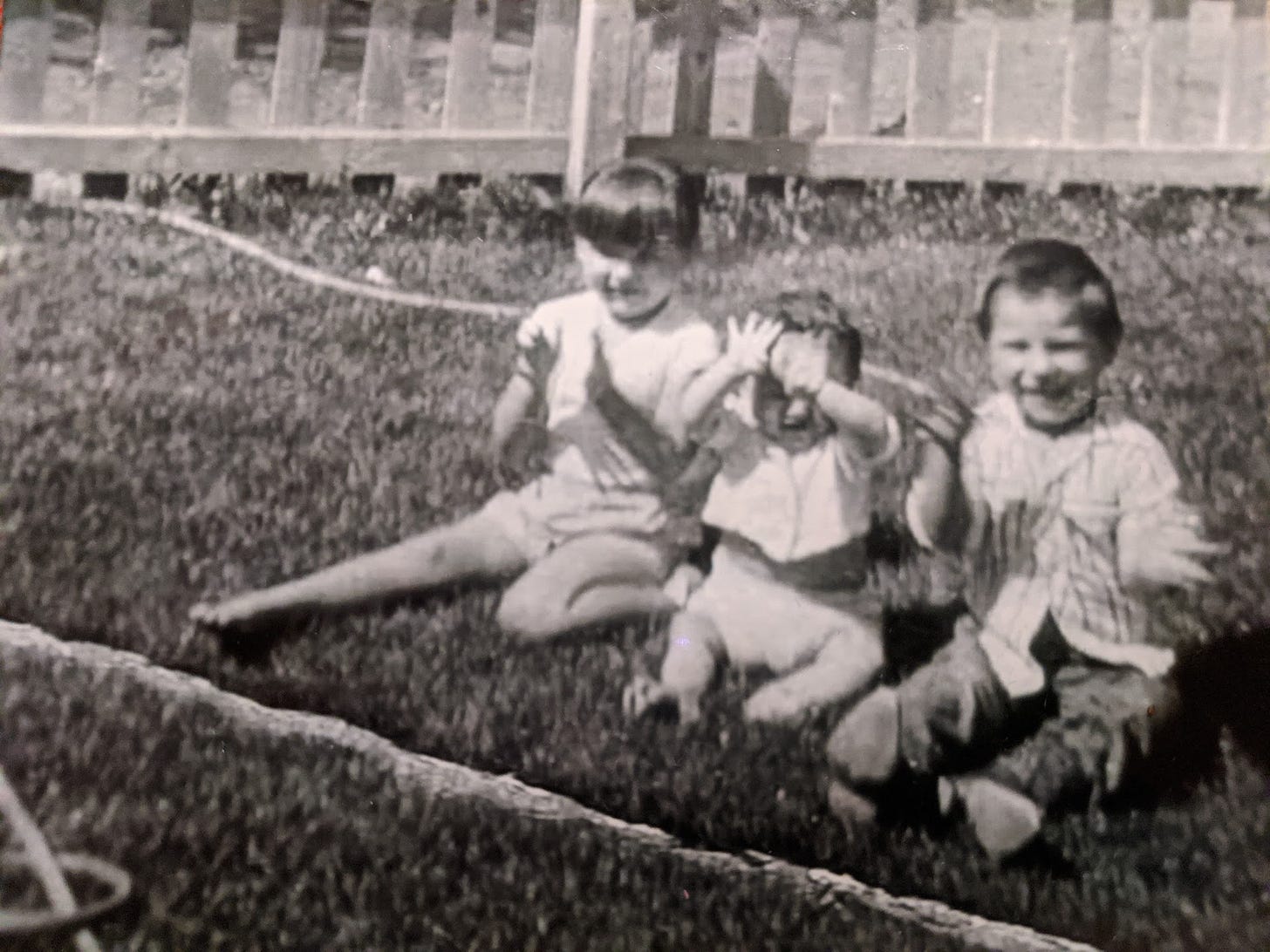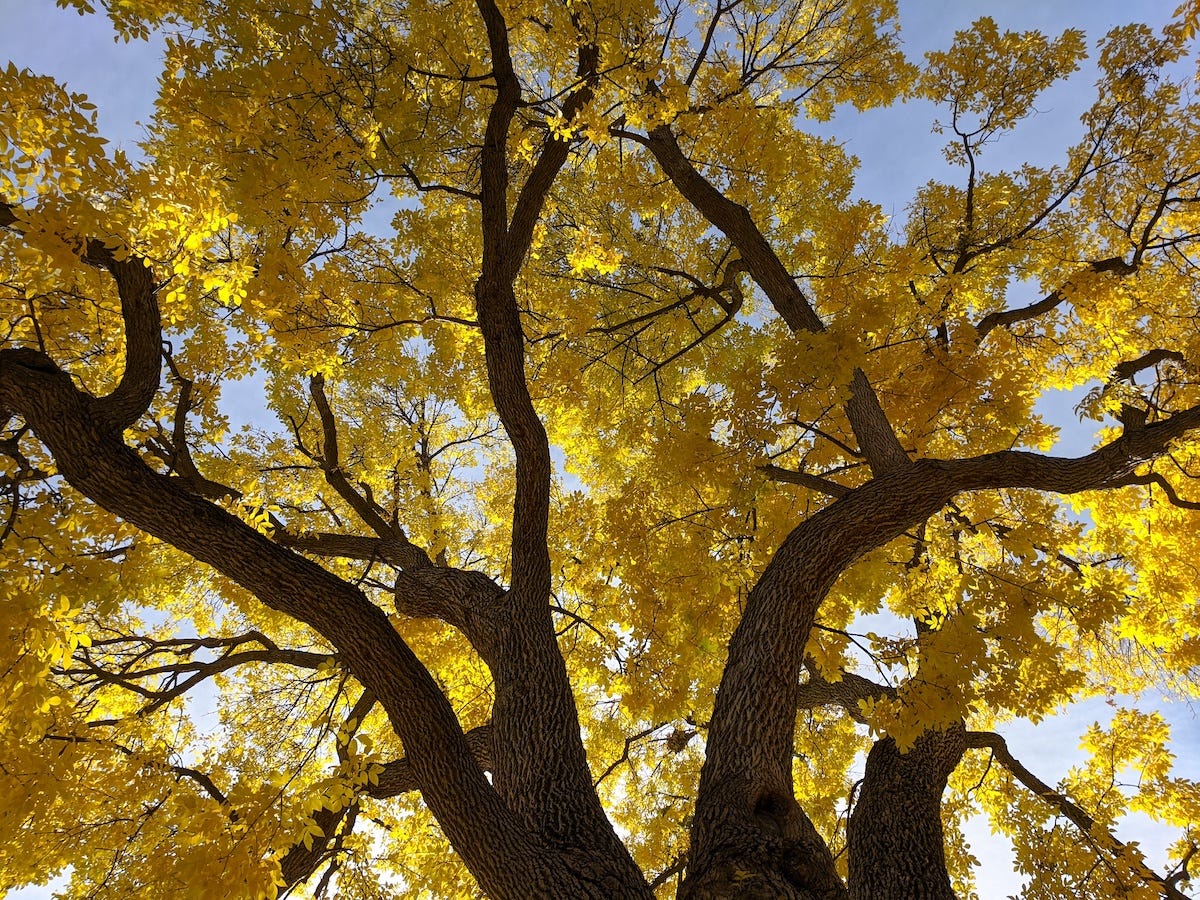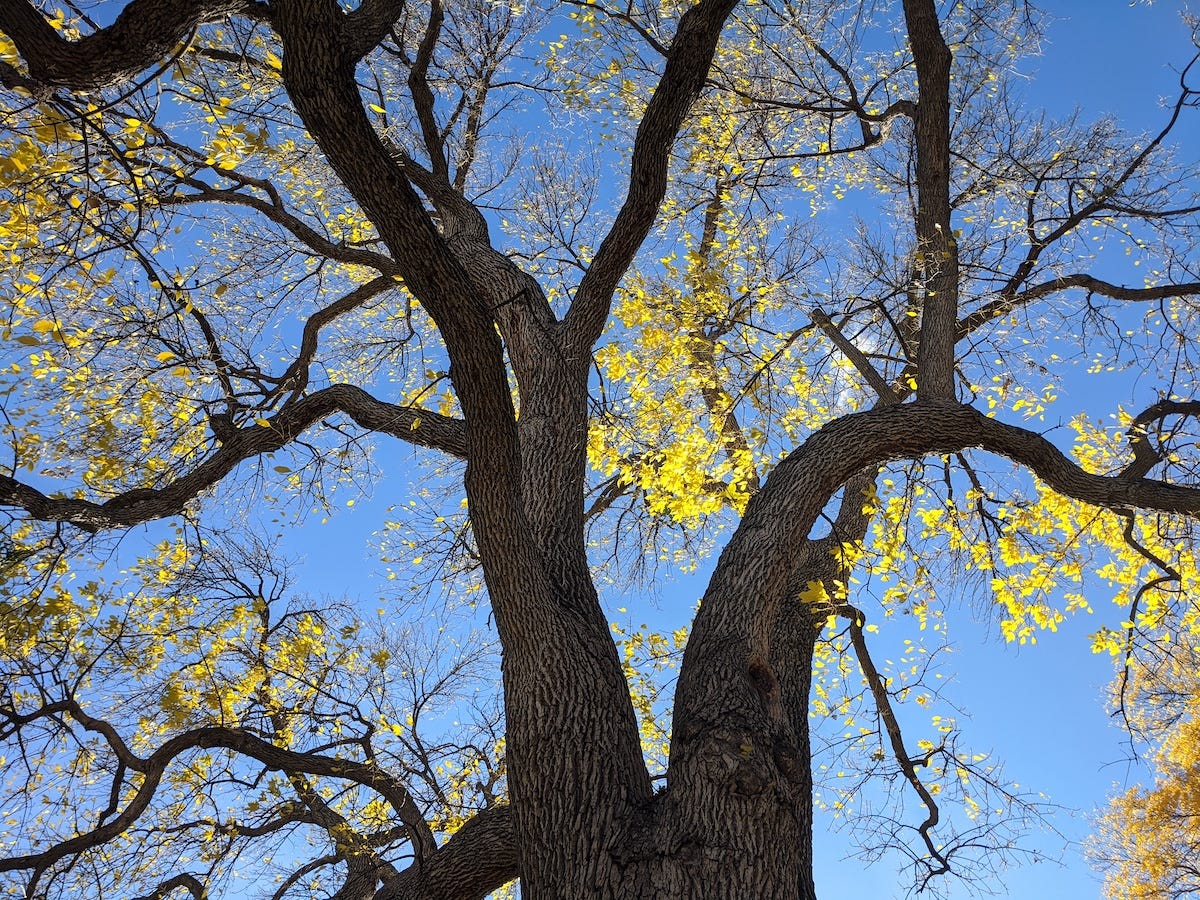Of fathers and biological fathers
Adoption forces you to expand your view of your family tree. And the certainty of death reminds you that, eventually, all the leaves will fall.
James's biological father is dying. The man who brought my only son into the world is dying. The bleakness of his condition, the imminence of his death, have been hanging over us all October.
It's been an especially colorful and lasting autumn where I live. The ash and narrow-leaf cottonwood have baked gloriously under the October sun. And without any hard freezes or snow, the leaves have lingered on the trees all month long. I have done all I can to drink of this beauty, to take in what the colors are offering. There's this quote from Thoreau that I came across that goes, "How pleasant to walk over beds of these fresh, crisp, and rustling fallen leaves. . . . How beautiful they go to their graves!" In an October like this year's, death can certainly feel beautiful. Or that in our dying a certain kind of beauty is glimpsed.
But Ron's death is not beautiful. (All names herein are not actual names.) It is brutal. Stage 4 bone cancer with the attendant chemo treatments. Plus dialysis for failing kidneys. While dealing with heart issues. While dealing with the cumulative health effects of a hard, traumatic, abusive life. A life spent looking for safety. A life spent in mines and construction and prison and rehab facilities. A life of loss and grit and grief.
The doctors have given him six months to a year.
When he dies, Ron will be leaving behind a family. There are a lot of hard things about this story. One hard thing is that I need to clarify which family of Ron's I'm talking about. His family tree is expansive. For example, James has a half-sister born of Ron who is as old as me and a half-brother who died long before James was born.
But this family is a relatively new shoot in the lineage. Ron married Amy shortly after James's adoption was finalized. Amy has a 6-year-old daughter, Layla, from a previous relationship, and together, she and Ron have two daughters, the older one a 3-year-old and the younger a 9-month infant. These are James's half-sisters. The 3-year-old, Eliza, looks like James, talks like and just as much as James, laughs like James, loves life like James.
So when Ron dies he'll be leaving behind a wife and three children. And also his son – my son – James Lee, named after Ron's brother. But James could just as well have been named after Lindsey's grandfather – James Travis Hale – and Lindsey herself, middle name of Lee.
James could just as well have been named for my grandfather, my dad's dad. Joseph Edmund James.
I never met Joe James. He died of polio only a month or so before my dad was born and two years before the Salk vaccine became widely available. My grandmother married Jake Sides sometime later, and that's how I became a Sides.
Adoption runs in our family.
I think of my dad. I think of James. I think of what we owe James. I think of what we owe Ron. I think of what my dad would give to have had just one visit with his biological father. Lindsey and I have adopted three kids, and due to the circumstances, none of them have been open adoptions, where the bio parents are seen and involved and known. But we have been re-thinking that.
James had weekly visits with Ron for the entire first year he was in our care. They would play and read books. James would show him toys from home. He called him Daddy Ron. The visits were hard on me and Lindsey. And James. It was like leaving our planet for another, and sometimes the "re-entry" could be a bit rough. When the parental rights were terminated, Ron and his extended family got one last visit with James – a "goodbye visit" is what the case manager called it. James was 3-and-a-half. I don't think the gravity of it registered consciously. But it likely left some kind of mark on his being – his body, his subconscious. They always keep score.
So James has early memories of his dad, albeit vague ones. But his heart is such that he cares very deeply about the well-being of Ron, even though it's been years since he saw him. Lindsey and I have had conversations with James about his bio dad's past, which only deepened James's empathy for him. The conversations—and James's anxiety—have been more frequent over the last month as we've worked to schedule a visit.
James's anxiety kicked into gear when we first learned of Ron's kidney failure. Things were not looking good, as his heart issues were keeping him from starting dialysis. On a Saturday morning in late August, Amy reached out to Lindsey and asked if we could come to their part of Northern Colorado and take her to see Ron in the hospital, because as it happened, the only car they had in their possession was a manual transmission, which Amy did not know how to drive.
We all piled in the van. Lindsey and I tried to prep James (and ourselves) for seeing his biological father again. We were aware that this could be a permanent goodbye visit.
Things went a little differently than planned. Ron got on dialysis, and his condition stabilized. But no visitors under 16 were allowed in the hospital. Lindsey drove Amy and their baby to the hospital so Amy could see Ron. I took our kids and Layla and Eliza to my Grandma Sarrah's house – who, as it happens, lives about five minutes from Ron and Amy's house. I felt like a foster parent again, running on a cocktail of adrenaline and stress and gratitude. Layla, their oldest daughter, likely has some trauma in her story. She acted half-flipped all day, perpetually, it seemed, on the edge of a meltdown. She wasn't easy for our kids to play with, and I was using a lot of Holy Spirit power to channel techniques and approaches that Lindsey and I learned in our fostering training.
Then there was Eliza. When we got out of the van to go into Sarrah's house, fear kicked in, and she let go of my hand and said she didn't want to go into that house. I knelt down at her eye level, told her that her mom would be back soon and that I'd be here the whole time. I picked her up and carried her inside, her head laid firmly on my shoulder.
I prayed over Amy and her kiddos when we dropped them off at their house a couple hours later. Layla's coping mechanisms had finally given up, and she had at last entered full meltdown mode. I asked her if she wanted to hold my hand. She did. She calmed down and kind of leaned against my side as I prayed. Eliza kept asking if we were going to stay for a sleepover.
We said goodbye and headed home. I think James was confused. I think he was worried. I think, deep down in his tender little heart, he was asking himself, "When will I see my dad?"
Every time that I've thought about how to write this story I keep hearing Tommy Lee Jones's character in the opening monologue in No Country for Old Men saying, "I don't know what to make of that. I sure don't."
I certainly don't know what to make of this. I don't how to make sense of a world where a life like Ron's and a death like Ron's are possible. Allowed. Experienced. Your soul definitely feels at hazard.
A week later, Ron called to tell Lindsey and I that he had stage 4 bone cancer. He thanked us for being James's parents. He told us how grateful he was for the home we were giving him. He told us to tell James how much he loves him, how much he's always loved him.
Cormac McCarthy has a lot to say about fathers. The Road is an extended meditation on a the depth and necessity of fathers and their relationships with their sons. (Skip the film, stick to the book.) But not many days go by when I think about the last scene in No Country for Old Men. (Stick to the film.) Tommy Lee Jones is weathered and wrinkled and wondering how he's going to live without his father "in all that dark."
Ron did not have a healthy relationship with his father. My dad never knew his father and it has haunted him all his life, even though his adopted dad – my granddad – loved the Lord and did a competent job in leading and providing for his family. James has a connection with his biological father, and if I'm honest I worry about how he'll tell himself this story in 10, 15, 20 years. I am afraid of how his heart will break six to 12 months from now.
I recently came across an audio clip on Twitter of a pastor speaking about fathers and what the role of a father entails. He said that fathers and God the Father exist to provide for their children, to bless their children. And without a father / Father, we stumble around this world as an "un-blessed people," flailing about in all that dark, "striving for approval."
A week ago, our schedules aligned and we visited Ron and Amy and their kids. The morning of, James was buzzing with excitement and expectation. This was the biggest day of the year to him. Our time with Ron was low-key and good and only a little awkward. James, surprisingly, was shy and quiet at first. Ron was feeling exhausted and beat up from dialysis earlier in the day, so his energy and mood were not what he wanted them to be.
But they shared meaningful moments together. There was a 20-minute stretch where they found a groove and talked freely about a wide range of things that make up so much of the fabric of life. Father and son, getting to know each other as if they were grade-school friends asking each other foundational questions about their favorite sports teams, past-times, and music. They bonded over their shared love of fishing, Marty Robbins, and pickles. They even found common ground in their passionate dis-liking of the Denver Broncos.
Ron brought out some family photos and talked us through the people in them. There was one of him and his sisters. There was one of his grandfather, who was a miner on the west slope of Colorado, in full mining gear. There was one of his grandfather and grandmother feeding each other a slice of cake at their 50th anniversary. He said they raised him for much of his growing-up years. He said we would have liked them.
Ron did not look like he was dying. His frame and his face looked as solid and as imposing as ever. He sounded like he was dying, though. His voice raspy and heavy, his breathing somewhat labored. He could barely walk from the living room to the kitchen. His eyes were tired. When it was just the two of us in the living room, he talked about what Amy and the girls will do once he's gone. I can barely bring myself to imagine those girls' futures. It feels dark and bleak, blacker than the coal mines Ron's grandfather used to work in.
I don't know if this was a goodbye visit for James. Ron said his first round of chemo didn't take, and his next round would be much more intense. As we said goodbye, I watched James hug Ron. His biological father. His dad. Ron spoke affirming, proud words. James quietly said thank you and lastly, "I love you."
I was so proud of James. Seeing his biological father was as much for him as it was Ron, but James held himself with poise and maturity. He gave of himself. He brought a dying man a bit of joy and closure. When Lindsey and I tucked him into bed that night, he smiled as he talked of Ron's mining days and dressed his favorite stuffed animal, his dear elephant, Ellie, in his baby onesie, which Ron gave him along with the family photos. He was so happy. It was as if an existential balm had been applied to his anxiety.
Then he asked if we could invite Ron to his birthday party next year (in October) "when he's feeling better."
When. I thought for a moment and then said that that was a great idea but we'd have to see.
My grandmother once told me that I look just like Joe James. That of her two sons born of Joe, that of all her grandsons, I'm the one who looks like her first husband. Lindsey reminded me of this the night of our visit with Ron, and I realized that I've only ever been sad for my dad and not for myself. For the first time in my life I am grieving the loss of the person I look like. I look just like my father's father. I look just like my biological grandfather. Like my dad, I never meet him. I am glad James can say he met his father, that he got to touch his father, that he got to feel his past and see in the flesh the man who brought him into this world before he leaves it. Before he flutters to the ground, drained of all his chlorophyl.
We all look like our Father. And one day...
There are two ways this can end. Here's the first option.
To be sure, we will all fall. But that's not all that can happen. I will let N.D. Wilson, in the final passage from Notes From the Tilt-a-Whirl, remind you of what else can happen after we go to our graves, no matter how beautifully we go.
These leaves aren’t fluttering; they aren’t spinning on sun-gold air. They are dying swiftly in the night, their colors already hidden. . . .
We are dying. We must die. The road is well traveled. We need not fear the dark, for the way is lit with Christmas lights.
We go into the ground, where the moss will feed on us and others will be stacked on top. We go into church floors and graveyards behind grocery stores. We go into the sea and the snow. We are devoured–be each other, by the earth, by time, by cancers and confusion, by the spinning of this sphere as it runs its balanced laps.
We are in winter, where the light dies and blood runs cold.
But we are not forgotten. Wet, ripped from the trees and trampled, we will not be lost, for we are His words, and when His voice calls, we will come.
Offstage, there is another greater stage.
Come, let us grow old like fishermen. Let us sweeten the air with songs while we fade. Let us die. Winter cannot hold us. Let us go into the ground, and our faces will find the sun. Let us ride the eruption of Easter.
Our Maker waits. He would have a conversation. What words will we have?
We need only one, the One who spoke us.
We will hear the angels sing. We will be the sheep. We will be made new and find ourselves standing in a garden. We will be handed bodies and shovels and joy.
No tree will be prohibited. . . .
We will laugh and carve FINIS on the earth. We will carve it on the moon. We will look to the Voice, to the Singer, the Painter, the Poet, the One born in a barn, the One with holes in His hands and oceans in His eyes, and on that day we will know—
The story has begun.
And we will rake the leaves.







Thanks for writing that. Every adoption is unique and profound. Make sure you save this in a place James can read it in 20 years.